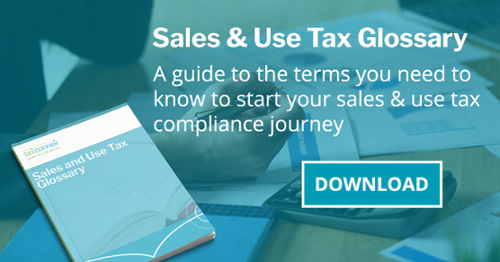Sometimes if we hear a phrase often enough, we don’t appreciate the importance of all the words. One such phrase is “sales and use tax.”
We sure know what “sales” tax is. What about Use Tax?
Use tax is defined as a tax on the storage, use or consumption of a taxable item or service on which no sales tax has been paid. A complementary or compensating tax to the sales tax, it’s required to be paid by the buyer in cases where the seller does not collect sales tax. Use tax or sales tax is due on a sale, but not both.
Use tax was designed to level the field of tax collection on transactions no matter where a buyer shops.
Your ‘choice’
Historically, (prior to the Wayfair decision) some states have given remote sellers the option of complying with strict use tax notification and reporting requirements rather than registering for sales tax under nexus provisions. Not to say that the option is simple.
In general, use tax notification and reporting laws require that you:
- Tell customers on your website that use tax may be due on purchases where sales tax hasn’t been collected;
- Include a notice with each applicable sale saying that you didn’t collect sales tax because you don’t have nexus and that use tax is due from the customer;
- Send an annual purchase summary statement to every affected customer; and
- Send an annual customer information report to each relevant state, giving customer names and addresses plus details about what each customer bought, when they bought it and what they paid.
Because of the level of complexity in adhering to these use tax notification requirements, many businesses simply registered for sales tax and started collecting and remitting the applicable sales tax.
Looking at Washington’s definition we learn that use tax is determined by the “value of the goods when first used in Washington”.. The tax is due if goods are purchased in another state that does not have a sales tax or a state with a sales tax lower than Washington’s; from someone who is not authorized to collect sales tax; or out of state by subscription, through the Internet or from a mail order catalog company. (“Many of these companies collect Washington’s sales tax, but if the company from which you order does not, you owe the use tax.”)
In a recent case, Washington held that a taxpayer’s out-of-state purchase of a travel trailer, which was driven to the state and then subsequently sold to a nonresident company, was subject to use tax. The taxpayer argued that because the vehicle was purchased out of the state and then sold to a nonresidential buyer two months later, his purchase should have avoided Washington’s use tax. The state successfully countered that the taxpayer assumed control of the vehicle the first time he drove it in Washington, making it subject to use tax.
Two types of use tax
For those that are at least somewhat familiar with use tax, it is often specifically the consumers use tax that comes to mind. Consumers use tax is what we have described above where a seller does not charge the sales tax, and the consumer (or buyer) owes the consumers use tax. There is also a sellers user tax. One quick explanation of the difference is an example from Alabama:
- What is consumer use tax? The consumers use tax is imposed on tangible personal property brought into Alabama for storage, use, or consumption in the state when the seller did not collect seller’s use tax on the sale of the property.
- What is sellers use tax? Sellers use tax is imposed on the retail sale of tangible personal property sold in Alabama by businesses located outside of Alabama which have no inventory located in Alabama, but are making retail sales in Alabama via sales offices, agents, or by any significant recurring contact or “nexus” with Alabama. (We often think of this as a sales tax, but in reality this is a sellers use tax that is collected.)
Understanding the various tax types is important as rates are potentially different and in some states there are separate returns due for each tax type. In a primer entitled “California Use Tax, Good for You. Good for California,” the Golden State says that those with a California seller’s permit must pay the use tax due on business related purchases with their sales and use tax return. Those not required to have a seller’s permit or a use tax account can e-pay use tax directly to the California Department of Tax and Fee Administration but “the easiest way to report and pay the use tax is on your California state income tax return.”
Easy or not, in many states, use tax is often harder to enforce. Still, you ignore it at your peril.
As with most things related to sales tax, use tax is not a one size fits all answer. By outsourcing sales and use tax management to an expert, you can save your business time, money and stress. Contact TaxConnex to learn how we can help.






.png?width=1200&height=628&name=2023%20logo%20with%20SOC%20and%20clearly%20rated%20(2).png)